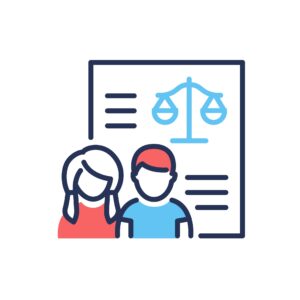If your child has been injured in an accident, been harmed by substandard medical treatment or suffered mental anguish due to a data breach, you may be looking to claim compensation on their behalf. You may be asking, ‘What is a litigation friend?’. This question can also come up when looking to claim on behalf of another protected person, such as someone who unfortunately lacks the capacity to bring their own claim.
We will explain what a litigation friend is, when one is needed and who can fulfil this important role.
If you would like to speak to an advisor, you can:
- Call us on 0333 000 0729
- Contact us via our web form
- Talk to us now using the Live Chat feature below

Select A Section
- What Is A Litigation Friend?
- Who Can Be A Litigation Friend?
- How Is A Litigation Friend Appointed?
- What Claims Can A Litigation Friend Be Appointed For?
- How Do Litigation Friends Assist In Compensation Claims?
- What Happens If There Is No One Suitable To Be A Litigation Friend?
- How Long Is A Litigation Friend Needed For?
- Learn More About Compensation Claims
What Is A Litigation Friend?
A litigation friend is appointed when someone lacks the capacity to conduct their own case or proceedings. Children who are under the age of 18 are deemed to lack this capacity, and to start a claim for a child; a litigation friend would be required. The other option is for the child to wait until they are 18 and begin their case as an adult.
Sometimes, people lack capacity due to the injuries they suffer, e.g. a significant brain injury after a cycling accident. Again, in these circumstances, someone would need to act on their behalf to make decisions about their case.
Two groups may require a litigation friend, which are children (minors, i.e. those under the age of 18) and those who lack the mental capacity to make decisions in their claim (called protected parties). The court appoints a litigation friend to make sure their best interests are protected.
To learn more about making a claim on behalf of a loved one, reach out to an advisor today.
Who Can Be A Litigation Friend?
A litigation friend is usually a parent or guardian, but it does not have to be. It does not need to be a family member, but it needs to be someone who can fulfil the role competently and act in the best interests of the protected person. As we will see in the next section, the court will need to approve anyone who seeks to act as a litigation friend.
Some examples of people who might act in this capacity include:
- A family member or trusted friend.
- A professional legal representative.
- A social worker or appropriately trained advocate.
- A Court of Protection Deputy or someone with power of attorney.
If you would like assistance with a potential claim for compensation, please get in touch.

How Is A Litigation Friend Appointed?
A litigation friend is approved by the court as part of the proceedings. A certificate of suitability has to be completed and sent to the court as well as the relevant parties to the claim. The certificate of suitability will state whether the claim involves a child or a protected party. If for a protected party, the reasons they are considered protected and any supporting medical evidence should be given. The litigation friend must state that they will conduct the court proceedings competently and fairly and that there are no conflicts of interest between them and the Claimant.
Where a deputy has been appointed by the Court of Protection under the Mental Capacity Act 2005, then a deputy can act as a litigation friend. They will file and serve an official copy of the Court of Protection notice appointing them as a deputy to allow this.
What Claims Can A Litigation Friend Be Appointed For?
To make a successful compensation claim, there are three eligibility criteria, which are:
- A duty of care was owed
- This duty was breached
- The breach caused harm or injury
We will now look at some example potential claims.
Personal Injury
Many duties are owed to people in everyday life that, if breached, could lead to personal injury. Road users owe a duty of care to other road users as they drive their vehicles, and they must follow the Road Traffic Act 1988 and the Highway code. For example, an HGV could change lanes when it is unsafe to do so, causing a crash on the motorway and leaving a child with a significant brain injury.
Whilst at work, employees are owed various duties including a duty for their employer to take all reasonably practicable steps to ensure their safety and welfare under the Health and Safety at Work etc. Act 1974. Another common duty owed is to the visitors of premises under the Occupiers’ Liability Act 1957, as under this legislation, those who control public spaces have to take reasonable steps to ensure visitors are reasonably safe.
Medical Negligence
Medical professionals owe those they advise and treat a duty of care. They must meet the minimum standard of care expected, and if they fall below this standard, it could cause avoidable harm.
For example, your child might have appendicitis, but the doctor fails to listen to you about the symptoms and takes an inaccurate history. This leads to a negligent GP misdiagnosis, and the appendix ruptures and causes complications.
Data Breach
A failure to adhere to data protection laws such as the Data Protection Act 2018 and the UK General Data Protection Regulations (UK GDPR) could lead to a data breach claim. For example, a teacher in a school might accidentally email the personal data of a child to the wrong address, causing anxiety and stress.
To discuss any aspect of bringing a claim on behalf of a protected party, please reach out to a friendly advisor.
How Do Litigation Friends Assist In A Compensation Claim?
Put simply, without a litigation friend, a protected party could not bring a compensation claim. Their role involves:
- Making decisions in the best interests of the person they act for.
- Explaining their case to them as it progresses, considering their thoughts, feelings, and needs.
- Coordinating between them and their legal representatives.

What Happens If There Is No One Suitable To Be A Litigation Friend?
A person may need a litigation friend but may not have a suitable or willing person available. In these situations, the Court may appoint an Official Solicitor to act instead.
To act, an Official Solicitor requires:
- Money to pay for their services.
- A statement from a medical professional confirming, if applicable, that the person lacks capacity to make a claim themselves.
To enquire about making a claim on someone else’s behalf you can reach us 24 hours a day.
How Long Is A Litigation Friend Needed For?
Usually, a litigation friend is needed until a case ends. Their appointment would end before then if:
- The child turns 18.
- The protected party gains the capacity to act independently.
There are also situations where a litigation friend can be replaced, whether for practical reasons or because they can no longer act in the claimant’s best interests.
If no longer needed or replaced, the person making that decision must provide evidence of the relevant change in circumstances to the court.
If money is awarded to a child or protected party, their litigation friend may need to look after it in a Court Funds Account (CFO).
If you are considering being a litigation friend or need one to start a claim, our panel is happy to advise you further.
- Call us on 0333 000 0729
- Contact us via our web form
- Talk to us now using the Live Chat feature below

Learn More About Compensation Claims
Below are some resources that can further your understanding of personal injury claims.
Our pages have advice on:
- Child Injury Claims Explained – our guide
- Consider our guide about road traffic compensation claims
- Holiday Harm – what do if you or your child have an accident abroad
Sites from around the Internet can help too:
- Guidance From The Government – What happens when the Court awards money to children?
- Civil Procedure Rules Part 21 – the official rules for appointing a litigation friend
- Independent Mental Capacity Advocates (IMCAs) – read more on the role of mental health advocacy and support from charity Mind
Thank you for reading our answer to the question, “What is a litigation friend?”.


